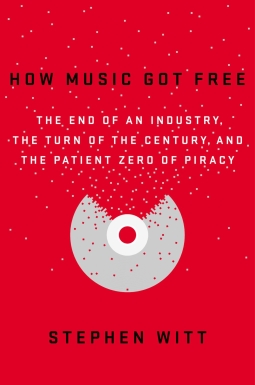What’s that? You want to reminisce?
Sure! I’m good at that…
It was September of 1998 and I was in first-year university.
I got my music at that time from C.D.’s. I hadn’t used a cassette in quite some time.
Earlier that year, a lot of people had discovered how to purchase a C.D. from a music store, take it home, copy the files onto their computer, and then return the C.D.
That sucks, right? For the musicians and for the music stores? Yes, but I’ve never been one to make attempts at redoing history. I’d rather be honest about what social norms and customs were at the time, and take responsibility for my actions. This was, in its very first form, music piracy. History will show that this was all part of the process in how music went digital, since the technology to copy music came along before the technology to stop people from copying music, and music stores allowed returns even if the plastic-wrap had been taken off the C.D.’s.
But in September of 1998, a friend of mine told me, “I found an even better way to get music!”
There was no better way. Not a chance.
“Download something called ‘Scour‘,” he told me. And I did.
I booted up Scour, and chatting with my friend through ICQ, since my phone line was my Internet line and I couldn’t speak to him on the land-line, he said, “Search for a song.”
Pop Quiz for those born in the 1980’s: What was the very first MP3 you ever downloaded?
Any guesses at mine?
Favourite bands of all time: Green Day, Pearl Jam, Red Hot Chili Peppers, Tom Petty & The Heartbreakers, The Offspring, Guns N Roses, The Doors, Blink 182, CCR, and others.
Was the first MP3 I ever downloaded by one of those banks?
Nope!
It was “Ghetto Superstar” by Pras, featuring Ol Dirty Bastard and Mya.
Hey, it was 1998, right? That song was huge!
So go ahead, tell me what your first MP3 was. I dare you!
And was it on Scour? Or Napster a few months later? If you’re younger, maybe it was Limewire or Kazaa. Maybe it was Frostwire. RapidShare or Pirate Bay?
I love talking about these days, and not just because time seems to be fleeting and I love to reminisce about good times, but also because my generation lived through a monumental event in human history. “The Internet” came into our lives in 1994, became mainstream in 1996, was a staple of our lives by 1998, and from then on, has changed the way we do everything, including find and listen to music.
For those interested, here’s a great book I read a few years back:

If you’ve ever wondered, “How did brand-new, hit music from top artists find its way to the Internet?” then this book is a must-read.
As history will show, and make bands like Metallica look like idiots for refusing to embrace new technology and way of life, there was not only a refusal to allow the technology to exist, but also a general refusal to learn and understand it.
So here I am, at 41-years-old, looking at Non-Fungible-Tokens and feeling like Lars Ulrich, yelling, “We don’t want you as our fans if you’re going to use Napster.”
What the @#$%&* is a Non-Fungible-Token, folks?
I mean, I know what it is. I know to the same extent that you and the person next to you can explain blockchain.
But what is it?
Why does it exist?
How does it help our lives? What benefit are we getting out of its existence?
And what benefit do we get from virtual real estate?
We have a housing crisis here in Toronto, right? It’s all we talk about.
So is our world going to get any easier if we start selling an NFT of houses and condos?
A reader sent me this absolutely mind-boggling article from the Miami Herald, of which I am now, unfortunately, a subscriber, which I’m going to reproduce here in full:
“Crypto Currency Creeps Into Real Estate: Miami Mansion To Be Sold As An NFT”
Michael Butler
Miami Herald
April 24, 2022
Despite a housing affordability crisis, Miami is emerging as a hub for cryptocurrency activity and a forthcoming luxury property sale could show what the South Florida real estate market of tomorrow looks like.
ONE Sotheby’s International Realty and Voxel Architects are collaborating with developer Gabe Sierra for Meta Residence, an 11,000-square-foot Miami mansion that will have a virtual counterpart in the form of a non-fungible token, or NFT. A digital token can be bought, sold, exchanged in various forms including images and audio.
The virtual counterpart will exist inside the metaverse on digital platform The Sandbox. The person that buys the NFT at auction later this year will then gain rights to the physical property expected to be finished by the end of the year.
ONE Sotheby’s International Realty agent Michael Martinez plans to execute the property’s sale on the Ethereum blockchain. The property’s reserve, or minimum, price has yet to be determined.
Sierra created the Meta Residence concept and has a construction management background. He has worked in luxury housing development for 10 years after learning from his father, developer Felix Sierra, who has worked as a developer for the past 30 years.
By having a house accompanied by an NFT of it, digital currency users can buy the house directly via blockchain. They would also later have the ability to transfer ownership of the house through smart contracts secured by blockchain.
“My vision of where this ends up is builders and creators building out digital extensions of real-world experiences,” Sierra said. “Whether it’s a house or hotel, you can build a mirror and extend on that for a digital extension of these real-world environments.”
A big question, though, is whether or when real estate NFTs will become mainstream in the Miami-area housing market for the properties middle-class residents can afford to buy. For now, homes like the Meta Residence are for people who can play in the luxury real estate arena.
With a replica of a real-world home existing in the metaverse, Sierra said clients from all over the world could virtually tour homes without having to travel to their physical locations.
“A big thing about building NFTs of properties in the metaverse is that you can show off properties much more early on in their buildout to people around the world,” he said. “Traditionally, people have to look at a picture or a rendering. Now we can show people homes in the metaverse.”
Sierra is a proponent of Web 3.0, the next generation of internet that’s unfolding in which users can create and have ownership of the digital space. He sees the Meta Residence as a convergence of the digital space and real estate. He thinks while NFTs will streamline the home-buying process, they will not make real estate agents altogether obsolete.
“A real estate agent still serves a purpose,” he said. “They would have to drive you to 20 houses, whereas now you could have a portfolio of houses they could show you in the metaverse. They would still show where they could buy land. This will make the buying process quicker. It’s just going to evolve how real estate works.”
Attorney Daniel Stabile has taught a blockchain regulation class at the University of Miami since 2018 and also wrote a textbook on the subject. As a member of the Miami-Dade County Cryptocurrency Task Force, he said that crypto can remove the need for certain intermediaries in business transactions like banks with digital currency being reliant on peer-to-peer engagement.
Stabile thinks that inefficiencies in how transactions are traditionally done amplify how crypto can be used in real estate. Many communities around the country are already looking at putting real estate titles on blockchain, he said. Putting real estate deeds on blockchain, he said, could be more secure than having paper records that can more easily be destroyed.
“We have a traditional database system that creates inefficiencies to the point you need title insurance,” Stabile said. “A blockchain is basically a database and can be public. People can have a high degree of confidence in it and it’s a good way to keep track of records.”
The concept of a property like the Meta Residence in Miami makes sense to Stabile, who says he thinks society is not far away from a world in which people seek financing to buy land in the metaverse.
He used the example of a high-end condominium sale to explain how digital tokens — NFTs — could change how real estate business is done.
“If when buying a high-end condo, instead of using cash, you could create a digital token to represent (it),” he said. “A reason for that is you could trade (the NFT) more rapidly and get liquidity 24/7.”
Anthony Varrell is the founder of Only Gems, a Fort Lauderdale-based company that is bringing asset-backed NFTs to the commercial market. His company possesses tangible collectibles such as a Dan Marino rookie Miami Dolphins card and creates NFTs to go with them. Many NFT exchanges only trade digital tokens that represent an actual item as opposed to having physical and digital versions.
Varrell eventually sees NFTs becoming necessary as identification cards like drivers’ licenses and binding legal documents such as property deeds. With the peer-to-peer communication structure of blockchain, he agreed with Stabile that intermediaries such as title companies that add costs to real estate transactions can be eliminated altogether and make the home-buying process less expensive.
“There’s no real reason for there to be a title company involved or any of the intermediaries involved,” he said. “However, if you really look at how the world works, I really think it’s going to take a while for that to take place because with the legacy systems, you can’t just say you’ll be making deeds into NFTs.”
Coldwell Banker regional vice president Nancy Klock Corey does not see the metaverse having a widespread effect on Miami real estate and the home inventory shortage anytime soon, since physical people and assets can’t be used in the metaverse.
Corey said having easily accessible information is essential for communities of all backgrounds to better understand how NFTs are bought, sold and exchanged.
“Whether the consumer chooses to invest in the metaverse or NFTs instead of (physical) real estate (similar to someone opting for the stock market versus buying real estate) still remains to be seen, but is certainly a possibility,” she said.
As Miami-Dade County becomes home to more technologists and finance professionals from other parts of the country and world, Stabile is aware housing in the city has become unaffordable for many of its longtime residents.
Stabile thinks educating residents about cryptocurrency can help more people utilize it as a resource, including to streamline real estate deals. He would like to see Miami-Dade partner with community organizations and activists to provide those educational opportunities.
“Blockchain at its heart is something that can help people,” he said. “A lot of populations are getting punished for not having a traditional banking relationship. With crypto, you can move this money for a fraction. We don’t want this technology to be one for the rich and powerful, we want it for everyone.”
“The automobile is a novel invention, but it will never become as commonplace as the bicycle!”
Am I the old man shaking my fist at a cloud here?
Or maybe I’m the dude still playing eight-track cassettes because “the sound is better.”
But what the hell does all this mean?
The metaverse eh?
Alright.
Elon Musk is exploring space and attempting to find an alternative for Earth to preserve humanity for future generations.
Alright.
But the metaverse?
Owning real estate near Snoop Dog?
Owning a house in the virtual world?
Blockchain and NFT as technologies will undoubtedly be part of our daily lives as the world moves forward, but all this talk of virtual real estate, mansions as NFT’s, and the Metaverse rubs me the wrong way. Like many sexy, new, speculative markets, it’s going to be a place where a handful of people get exceptionally rich and everybody else gets burned…
































hoob
at 8:51 am
Since you asked.. Norman Greenbaum, Spirit in the Sky. And I’m only a bit older than you.
And NFTs as a marketplaec are the dumbest thing in a long time (nothing wrong with the mathematical concept of NFT, but lacking any other legal construct to bind it to a Legal Chattel, it’s pointless.)
David Fleming
at 9:36 am
@ hoob
LOL I love that you remember this! It’s our generation’s, “Where were you during the moon landing” sort of question.
Norman Greenbaum, total one-hit wonder. And despite the song having a gospel tone and lines like, “I’ve got a friend named Jesus,” Norman Greenbaum is actually Jewish.
Perhaps an interesting follow-up question: “In what movie did you first hear ‘Spirit In The Sky’?” It’s been in so, so many movies.
Anyways, thanks for sharing!
Daymond
at 10:15 am
TLC’s No Scrubs. Probably spring of 1999.
Thank you for reminding me how old I am lol
hoob
at 7:24 pm
Since you asked, Contact. 😀
Steve
at 9:36 am
The main challenge I have with NFTs in the context of real estate is at the end of it all you are still going to have a centralized entity that is tracking the actual title, which means the NFT part is really just misdirection as is the part about the metaverse representation being that much better than a sufficiently advanced rendering.
I do feel like there is a place for cryptocurrency and blockchain as a part of improving some of the clunkier aspects of real estate transactions though…we can start with deposit cheques…
London Agent
at 10:00 am
The idea of owning real estate (or any other tangible item) in the Metaverse is useless until we have a way to experience it in a meaningful way. And at that point, why in the hell do we want to live a “meaningful” life in the Metaverse. Is Zuckerberg working for the machines in the Matrix???????
Geoff
at 10:14 am
I find it interesting that someone who collects and spends big money on hockey cards doesn’t get NFT’s. Value is in the eye of the collector. (agree on speculators getting wrecked but that happens in all markets).
J
at 11:49 am
Courts of law, governments, banks, insurance companies, etc. will only care about the standard documentation that will surely exist in parallel to the NFT of the Miami mansion. The developer could try to link the mansion’s ownership to the NFT, but once the deal closes the developer is out of the picture.
When the purchaser’s digital wallet gets hacked and the NFT is irreversibly stolen, the purchaser will be thankful that the NFT is completely meaningless.
Julia
at 7:19 pm
This is not NFT related but definitely Fun Realestate Friday! https://www.tiktok.com/@bennydrama7/video/7092100971983080746
Enjoy and happy weekend!
EastYorker
at 5:08 pm
What happens when you get evicted from the place you are plugged into ?
Or when the power goes out ?
Alex
at 10:53 am
Thank you for the detailed information. I believe in crypto and I am an investor in crypto mining hardware purchased from ASIC miner for sale. I think that crypto has a lot of potentials and I am excited to see what the future holds for it. For Crypto-related Hardware you can visit: asicminerforsale.com Thank You.